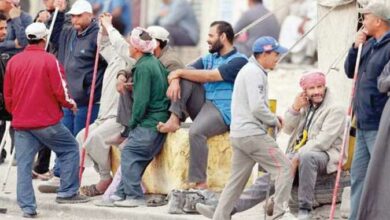Around 300 Mansoura residents gathered Tuesday to participate in a march and conference as part of Egypt’s Labor Day commemorations.
The march departed at noon from Mansoura Stadium and continued to the city’s governorate headquarters, where numbers of participants steadily increased amid chants against the military council and capitalism. Protesters also raised the demands of “bread, freedom, and social justice” that have been repeated at protests throughout the past year.
Shortly after the march, a conference was held at a central square, in which leaders from various workers unions gave speeches.
Gamal Aouda, head of the regional independent syndicates union, announced several demands, including a minimum and maximum wage, the writing of a unions’ rights law, greater representation in the Constituent Assembly for the country’s nearly 26 million workers, a solution to the problem of temporary labor, and a law providing medical insurance.
“A general strike is not on the minds of the workers now, but we do not rule out its use as a means to escalate in the absence of a time frame for the implementation of our demands,” Aouda said.
The far-left Revolutionary Socialists also attended the conference. Mahmoud Swielem, an activist and member of the group, said: “We are looking forward to uniting labor with students, as the path to freedom begins with social justice.”
Hafez Shaker, a worker recently fired after 28 years at a Mansoura factory, said that he came to the protests to express feelings of injustice towards a system that “treats laborers worse than the slaves of the middle ages,” noting that “labor is the true future of any country, and no one has been helping labor in Mansoura — especially not the [Prime Minister] Ganzouri government” which Shaker described as “much worse than [Mubarak-era Prime Minister Ahmed] Nazif's.”
Emad al-Dahtory, a speaker on behalf the Revolutionary Socialists, described the day as “a very good step toward a new role for labor in the country and toward organizing laborers seeking social justice.”
Later in the day, activists showed a video produced by the April 6 Youth Movement highlighting the role of workers’ struggles in Egypt from the 1919 Revolution until the 25 January Revolution.
Sara Ghabour, the head of Khalid Ali’s presidential campaign in Mansoura, a candidate closely associated with labor rights, said that she was attending the day’s events in solidarity with workers, whose demands the revolution was initially intended to accomplish.
“We will always be here with [the workers],” she said, “even if Khaled Ali doesn’t win the elections.”




